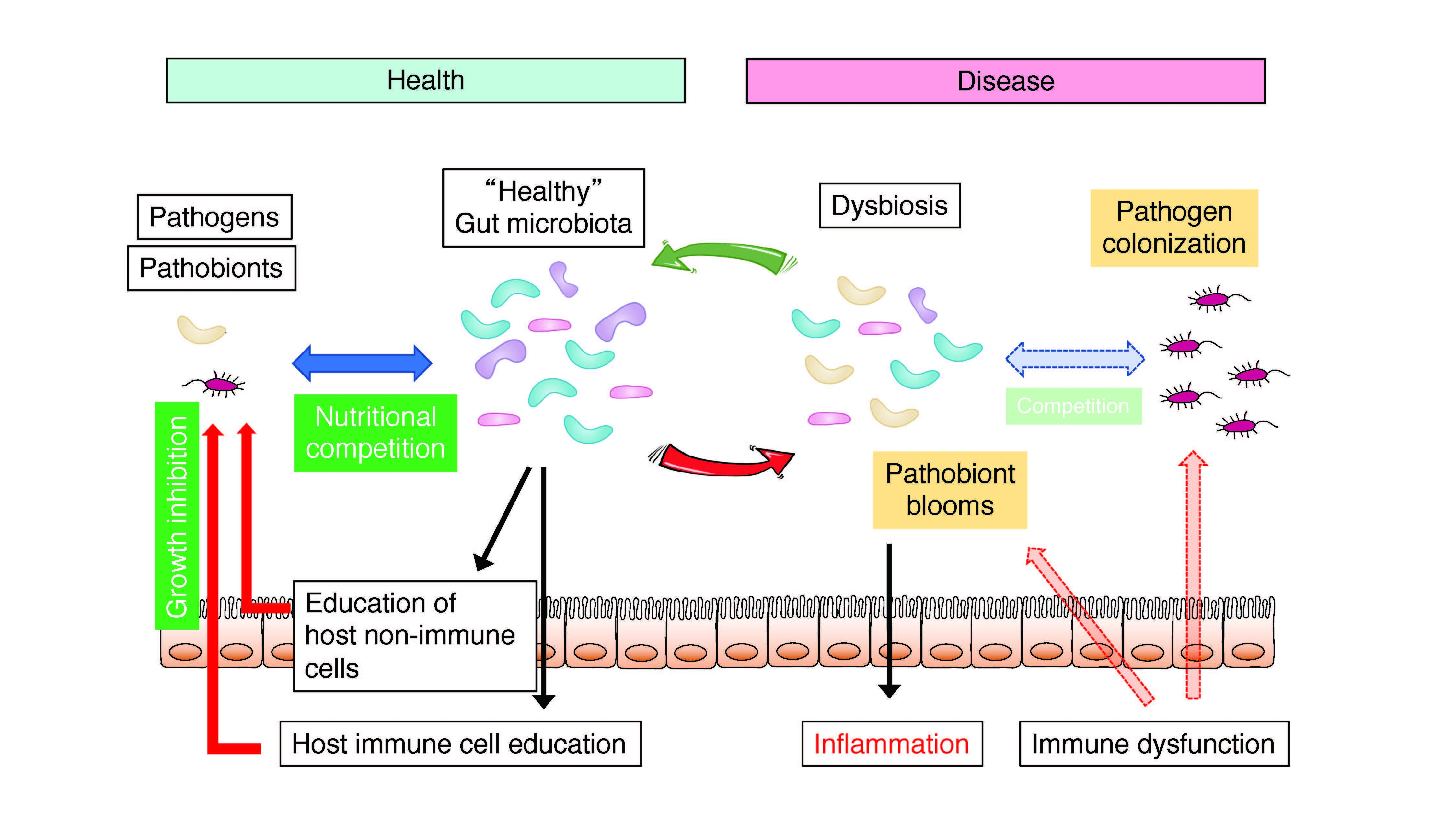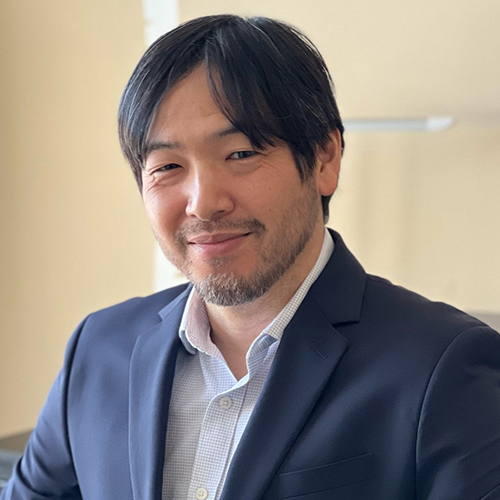Microbiology and Immunology
TEL +81-6-6879-4928
Overview
Research Interests:
My research aims to answer a fundamental question: how does the gut microbiota interact with host immunity in the context of gastrointestinal health and disease (e.g., inflammatory bowel disease (IBD), gastrointestinal infection, and colorectal cancer)? We are interested in the mechanisms by which certain pathogenic members of the commensal microbiota (so-called pathobionts) cause/exacerbate disease and the commensal beneficial microbiota works cooperatively with host immunity to combat pathogenic microorganisms within the gastrointestinal tract. We are also interested in the role of dietary factors in the regulation of competition between pathogenic and beneficial bacteria as well as the direct impact of dietary nutrients on host immunity.

Principal Investigator
Nobuhiko Kamada Professor

Research field
Interaction of gut microbiota with host immunity
Education history
| 1998 | B.S. Faculty of Pharmaceutical Sciences, Kobe-gakuin University |
|---|---|
| 2000 | M.S. Graduate School of Pharmaceutical Sciences, The University of Tokushima |
| 2007 | Ph.D. Keio University School of Medicine |
Research and career history
| 2001 | Visiting researcher: Division of Gastroenterology and Hepatology, Department of Internal Medicine, Keio University School of Medicine (-2004) |
|---|---|
| 2004 | Research associate: Division of Gastroenterology and Hepatology, Department of Internal Medicine, Keio University School of Medicine (-2007) |
| 2007 | Instructor (Non-tenured): Division of Gastroenterology and Hepatology, Department of Internal Medicine, Keio University School of Medicine (2009) |
| 2009 | Research fellow: Department of Pathology and Comprehensive Cancer Center, University of Michigan Medical School (Mentor: Gabriel Núñez) (2013) |
| 2013 | Assistant Professor (tenure-track): Division of Gastroenterology, Department of Internal Medicine, The University of Michigan Medical School (-2020) |
| 2020– | Present Associate Professor (with tenure): Division of Gastroenterology, Department of Internal Medicine, The University of Michigan Medical School |
| 2021– | Professor: Osaka University Immunology Frontier Research Center |
Members
-
Nobuhiko Kamada Professor
nobukamadaifrec.osaka-u.ac.jp
Achievements
Publications
-
Kamada N, et al. Unique CD14-positive intestinal macrophages contribute to the pathogenesis of Crohn’s disease via IL-23/IFN-gamma axis. J Clin Invest. 2008: 118(6): 2269-2280.
-
Kamada N, et al. Hisamatsu T, Honda H, Kobayashi T, Chinen H, Takayama T, Kitazume MT, Okamoto S, Koganei K, Sugita A, Kanai T, Hibi T. Human CD14+ macrophages in intestinal lamina propria exhibit potent antigen presenting ability. J Immunol. 2009; 183(3):1724-1731.
-
Franchi L*, Kamada N* (* co-first author), et al. NLRC4-driven IL-1b Production Discriminates Between Pathogenic and Commensal Bacteria and Promotes Host Defense in the Intestine. Nat Immunol. 2012; 13(5):449-56.
-
Kamada N, et al. Regulated virulence controls the ability of a pathogen to compete with the gut microbiota. Science. 2012; 336(6086):1325-9.
-
Kamada N, et al. Humoral Immunity in the Gut Selectively Targets Phenotypically Virulent Attaching-and-Effacing Bacteria for Intraluminal Elimination. Cell Host Microbe. 2015;17(5):617-27. 42.
-
Seo SU, Kuffa P, Kitamoto S, Nagao-Kitamoto H, Rousseau J, Kim YG, Nunez G, Kamada N. Intestinal macrophages arising from CCR2+ monocytes control pathogen infection by activating innate lymphoid cells. Nat Commun. 2015;6:8010.
-
Nagao-Kitamoto H, Shreiner AB, Gilliland III MG, Kitamoto S, Ishii C, Hirayama A, Kuffa P, El-Zaatari M, Grasberger H, Seekatz AM, Higgins PDR, Young VB, Fukuda S, Kao JY, Kamada N. Functional characterization of inflammatory bowel disease-associated gut dysbiosis in gnotobiotic mice. Cell Mol Gastroenterol Hepatol. 2016;2(4):468-481.
-
Imai J, Kitamoto S, Sugihara K, Nagao-Kitamoto H, Hayashi A, Morhardt TL, Kuffa P, Higgins PDR, Barnich N, Kamada N. Flagellin-mediated activation of IL-33-ST2 signaling by a pathobiont promotes intestinal fibrosis. Mucosal Immunol. 2019; 12(3):632-643. doi: 10.1038/s41385-019-0138-4.
-
Kitamoto S, Alteri CJ, Rodrigues M, Nagao-Kitamoto H, Sugihara K, Himpsl SD, Bazzi M, Miyoshi M, Nishioka T, Hayashi A, Morhardt TL, Kuffa P, Grasberger H, El-Zaatari M, Bishu S, Ishii C, Hirayama A, Eaton KA, Dogan B, Simpson KW, Inohara N, Mobley HLT, Kao JY, Fukuda S, Barnich N, Kamada N. Dietary L-serine confers a competitive fitness advantage to Enterobacteriaceae in the inflamed gut. Nat Microbiol. 2020;5(1):116-125.
-
Nagao-Kitamoto H, Leslie JL, Kitamoto S, Jin C, Thomsson KA, Gillilland MG 3rd, Kuffa P, Goto Y, Jenq RR, Ishii C, Hirayama A, Seekatz AM, Martens EC, Eaton KA, Kao JY, Fukuda S, Higgins PDR, Karlsson NG, Young VB, Kamada N. Interleukin-22-mediated host glycosylation prevents Clostridioides difficile infection by modulating the metabolic activity of the gut microbiota. Nat Med. 2020;26(4):608-617.
-
Kitamoto S, Nagao-Kitamoto H, Jiao Y, Gillilland III MG, Hayashi A, Imai J, Sugihara K, Miyoshi M, Brazil JC, Kuffa P, Hill BD, Rizvi SM, Wen F, Bishu S, Inohara N, Eaton KA, Nusrat A, Lei YL, Giannobile WV, and Kamada N. The intermucosal connection between the mouth and gut in commensal pathobiont-driven colitis. Cell. 2020;182(2):447-462.
